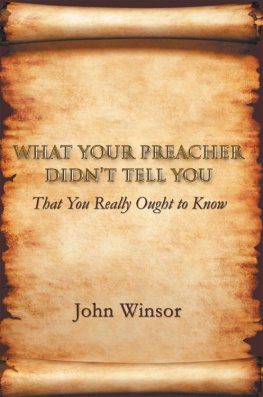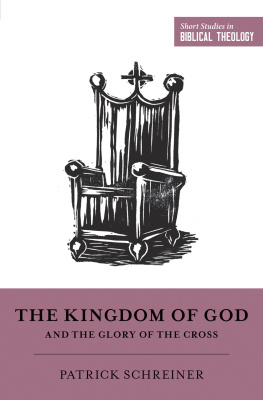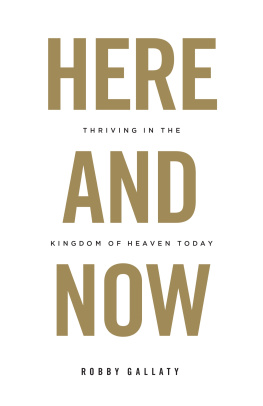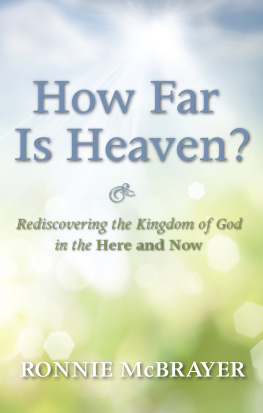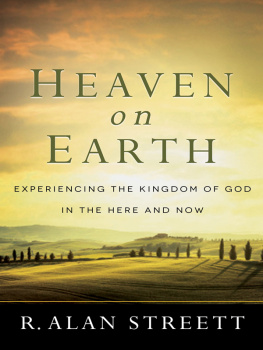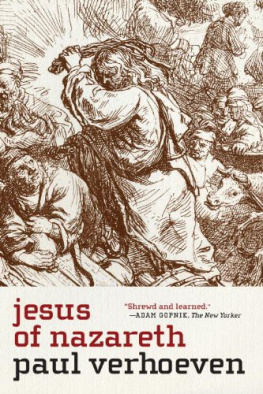WHAT YOUR PREACHER
DIDNT TELL YOU
That You Really Ought to Know
John Winsor
iUniverse, Inc.
Bloomington
What Your Preacher Didnt Tell You
That You Really Ought to Know
Copyright 2011 by John Winsor.
All rights reserved. No part of this book may be used or reproduced by any means, graphic, electronic, or mechanical, including photocopying, recording, taping or by any information storage retrieval system without the written permission of the publisher except in the case of brief quotations embodied in critical articles and reviews.
iUniverse books may be ordered through booksellers or by contacting:
iUniverse
1663 Liberty Drive
Bloomington, IN 47403
www.iuniverse.com
1-800-Authors (1-800-288-4677)
Because of the dynamic nature of the Internet, any web addresses or links contained in this book may have changed since publication and may no longer be valid. The views expressed in this work are solely those of the author and do not necessarily reflect the views of the publisher, and the publisher hereby disclaims any responsibility for them.
Any people depicted in stock imagery provided by Thinkstock are models, and such images are being used for illustrative purposes only.
Certain stock imagery Thinkstock.
ISBN: 978-1-4620-5726-9 (sc)
ISBN: 978-1-4620-5727-6 (hc)
ISBN: 978-1-4620-5728-3 (ebk)
Library of Congress Control Number: 2011918535
Printed in the United States of America
iUniverse rev. date: 10/12/2011
Contents
. . . and you will know the truth
and the truth will make you free.
John 8:32
What your preacher didnt tell you is this: Christianity as we know it was a Medieval invention. Christian dogma conflicts with historical and scientific facts. It also directly and strongly contradicts what Jesus himself taught. He didnt believe that he was divine or that he or anybody else was bound for heaven. Although he was mistaken, he expected to become an earthly king. I intend to support these assertions with his own words. The Bible itself is my primary source, so at any time you doubt my position, I encourage you to look up the passages I cite and judge for yourself.
PREFACE
As a boy, I attended church and Sunday school. I was an altar boy and a member of the childrens choir. I hadnt actually formulated my own beliefs. I simply behaved as the people around me expected. However, I was curious and, like many people, I pondered some of the more obvious Biblical puzzleslike how a just a merciful God could inflict natural disasters on people who had done nothing wrong, how people could be sent to heaven or hell based on their beliefs when they were taught what to believe, where Cain and Abelsons of the only parents on earthfound wives, how we knew that we were right and those who practiced other religions were wrong, and so forth.
Over time, my list of questions grew, so I did something that most Christians never do: I read the Biblenot just the cherry-picked passages that preachers routinely quote, but also the ones that are neglected in sermonsand I discovered more and more contradictions and absurd propositions. In undergraduate school, I debated religion with my fellow studentsnot merely to be contrary but to persuade. I learned that even very bright believers simply cant or wont rationally address some questions. Like many nonbelievers (and very few believers), I continued to study the Bible and its history. What I discovered was a tale of deceit and treachery and greeda power struggle among priests and kings that began hundreds of years before Jesus was born and continues to this day. One of the most important lessons I learned is that modern Christianity isnt based on what Jesus actually taught or believed.
True believers tend to assume that their preachers words are divinely inspired and, therefore, above reproacheven though preachers routinely disagree with one another. This is because parishioners have been trained to regard gullibility on religious issues as faith, which is supposedly a virtue. Fundamentalists generally vote for politicians who invoke Gods name and advocate policies that their preachers also supporteven when those policies are strongly at odds with what Jesus himself taught. Ever since the late Jerry Falwell formed the Moral Majority, religion has insinuated itself more and more into American politics and the impact has poisoned our public discourse. Because this trend undermines our national discourse, I decided that it was time to respond. This book is my response. If I fail to persuade you that Christianity is false, I hope at least to make it clear that this trend is insidious.
Im not a Bible historian, but Ive read and understood a great deal of what real Bible historians have written. Much of it is rather pedantic and can be baffling for uninitiated readers. So, I decided to write a more straightforward (though less scholarly) argument against religion in general and Christianity in particular. Bible historians do the tedious work of studying the trees, but I intend to present the forest in a way that, just maybe, only a layman can and your preacher certainly never will.
THE PLAN
Many books about Bible history are either so pedantic or so narrow in scope that they can leave the uninitiated reader bewildered. My primary aim in this book is to present some basics on Bible history in a straightforward manner so that uninitiated readers can discern the fundamental truthsthat the Bible is a mix of myths, distorted history, and conflicting messages, and that the precepts of modern Christian dogma conflict with what Jesus himself taught. Most people are unaware of Bible history. Im referring not just to the history in the Bible, but also to the history of the Biblethe events surrounding its creation.
This may be a challenging read. All I ask is that you try to consider the evidence that I present without forming knee-jerk responses based on preconceived notions. Thats a pretty tall order. If youre a Christian, youve had years of careful indoctrination in one view of the Bible. Much of that indoctrination took place before you were old enough to question it rationally. The dogma was inculcated via rote memorizationthrough rhythmic recitation, songs, and participation in various reinforcement rituals. You began committing Biblical text to memory before you could understand what it meant.
A great deal of the information that Ill cover is based on research by Bible historianswho are frequently clergymen. In general, they set out to understand the Bible better, not to discredit it. They study its source documents in their original languages in order to decipher their meanings and to discover the circumstances in which they were written. So, even if you dont accept my conclusions, you might find this book to be an interesting read. Despite what fundamentalists believe, the Bible isnt a single narrative dictated by God to the prophets. The history of its development is actually quite well documented. Here are a few irrefutable facts about the Bible:
Its contents were selected and edited by Medieval Europeans.
Nearly all of it was written long after the events it purports to describe.
The text was frequently modified, sometimes for political reasons.
Nothing in it is completely reliable.
A great deal of it is absolutely false.
Medieval scribes copied manuscripts by hand. Over time, this resulted in many thousands of discrepancies. Most were typographical errors, but some were intentional insertions, deletions, and alterations of profound theological significance. Because of this, many Bible historians devote their careers to determining the chronological order in which the surviving documents were created in order to find the original meanings. In addition to mistranslations and alterations to existing documents, many of the Bibles books are outright forgeries, as Bart Ehrman has demonstrated. The problems are major. In the next few paragraphs, for example, are a few terms and concepts that were mistranslated or abusedin at least some cases, intentionally.
Next page
